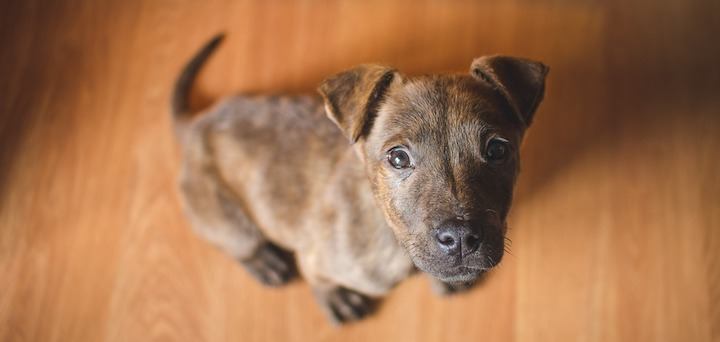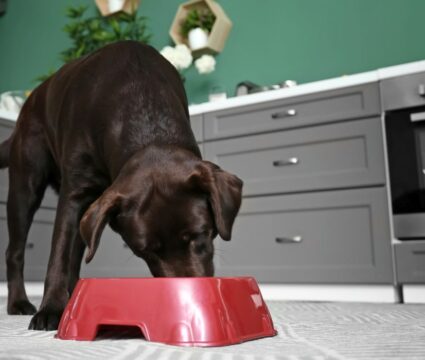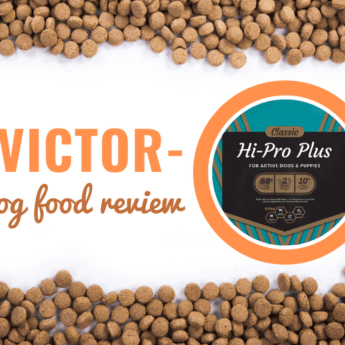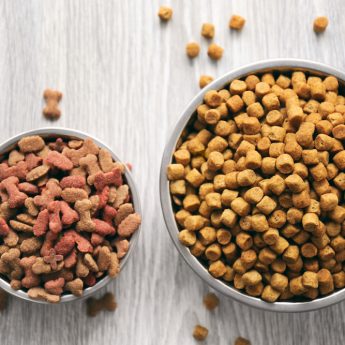Many new puppy owners are overwhelmed by the myriad food choices available. Chicken or beef? Whole grains or none? The questions multiply with every additional click of your laptop or step you take down the pet store aisle.
One of the most common questions concerns the differences between adult dog food and that which is designed for growing puppies. Many new owners wonder if they really need to purchase food marketed for puppies, or if they can get by with the standard foods marketed for adults.
The simple answer? You should feed puppy food to puppies and feed adult food to adult dogs. They are both designed with different goals in mind.
There’s certainly nothing toxic about adult dog food, and your puppy won’t become sick from eating the odd bowl of kibble or stealing morsels from his big-brother’s dish (aside, potentially, from some minor digestive upset). However, long-term damage can result from a steady diet of adult dog food.
Adult dog food is formulated much differently than puppy food, and these differences are important for the long-term health of your pet.
Differences Between Puppies and Adult Dogs
The entire reason that puppies and adults have differing nutritional needs is because they have important biological differences. They work differently, so they need different types of fuel.
For example, because of their small size, puppies have a higher surface-to-volume ratio than adult dogs do. This means that they lose body heat more quickly than adult dogs do. Puppies have to work harder to maintain their body temperature than larger, adult dogs do (although the same is true of small breeds vs. large breeds). This is also why puppies and small breeds tend to adore heated dog beds.
“Working harder” essentially means burning more calories in their internal furnaces, to offset the body heat that they continually radiate into the environment. This means puppies need more calories per pound of body weight than non-pregnant, non-lactating adults do.

Additionally, puppies grow rapidly; dogs complete the bulk of their growth in the first two or three years of life. This growth requires different resources than simply living does. Specifically, it means that puppies require more amino acids – the building blocks of proteins, and therefore tissues – than adults do.
Differences Between Puppy Food vs Adult Dog Food
As you’d expect, the differences between the biology of puppies and that of adults manifest as different nutritional requirements.
Perhaps not surprisingly, puppies and lactating mothers both have relatively similar nutritional needs. This has led the Association of American Feed Control Officials (AAFCO) – the primary regulatory body for dog food – to develop two different categories for food: “adult maintenance” versus “growth and reproduction.” We’ll call them adult and puppy for short – just know that dog food fur puppies is also good for lactating dogs.
The biggest primary difference between puppy food (growth and reproduction recipes) and adult (maintenance) food relates to protein. Puppy food should derive 22.5% of their calories from protein sources, while adult foods need only 18% of their calories from protein.
Adults can certainly tolerate the higher protein levels of puppy food, but it may lead to weight gain, due to the higher amount of protein calories.
However, puppies will often suffer from developmental problems if fed an adult food and deprived of the proteins they require.
Remember: “protein” really refers to a soup of different amino acids. Because not all amino acids are created equally, the AAFCO recommends differing amino acid compositions for adult and puppy dog foods.
Some of the starkest contrasts of amino acid compositions include:
- Argine
- Histidine
- Isoleucine
- Leucine
- Phenylalanine
- Ohenylalaline-tyrosine
- Thereorine
The AAFCO requires nearly 2x the amount of each of these amino acids in puppy foods than it does in adult dog foods. That is because these amino acids are intrinsic to the growth process.

The AAFCO also requires puppy foods to contain a bit more fat than adult foods do. Per the guidelines, adult food need only derive 5.5% of their calories from fat, while puppy food must derive 8.5% of their calories from fat. This is primarily to ensure that puppy foods are “energy dense.”
Fats contain more calories per pound than either proteins or carbohydrates do, which ensures that puppy food is packed with energy for stoking their internal fires.
Adult maintenance formulations, by contrast, are designed to be leaner, so they contain less fat, and therefore fewer calories in every bite.
The mineral content of puppy foods also differs from those of adult dog foods. For example, per AAFCO guidelines, puppy foods must be 1% calcium, while adult foods need only be 0.6% calcium. Similarly, puppy foods must be 0.8% phosphorus, while most adult dog foods are only 0.5% phosphorus.
What about Foods for “All Life Stages?” Are They Safe for Puppies?
In addition to foods that are labelled as being appropriate for “growth and reproduction” or “adult maintenance,” you may also see foods bearing a label that indicates they are appropriate for “all life stages.”
These foods are appropriate for most healthy dogs (they may not be good for some senior canines), so you can go ahead and feed them to your puppy.
These foods are designed to meet the requirements for “growth and reproduction” and “adult maintenance.” But because the nutritional requirements for puppy foods exceed those of typical adult foods, it means these are essentially puppy food.
Because they have higher protein and fat content than many adult foods, you will want to keep an eye on the body weight of adult dogs fed such recipes.
But as long as your pooch stays nice and svelte, they’re fine for adults too. This extra protein also makes puppy food or “all life stages” food a great dog food for weight gain if you’re trying to get a thin dog to a healthier weight.
Transitioning Your Puppy to Adult Dog Food
As your puppy ages, the difference in her nutritional needs will change. She’ll need fewer of the resources in her food to contribute to growth, but she’ll need more to support maintenance. As a result, you’ll need to switch her to a new dog food for adults as she completes these changes.

When to Transition to Adult Food
Consult with your vet to help determine the best time to change from puppy food to big-girl food, but most dogs are ready to change foods between 18 and 24 months of age. The exact age at which your “puppy” becomes a “dog” varies from one individual to the next, but most small breeds mature at relatively young ages, while most giant breeds require 2 years or more to fully mature.
Make the Change Gradually
Regardless of your pup’s age at the time of the food transition, it is important to make said transition gradually.
Start by mixing in a little adult dog food with your pup’s typical puppy food diet. About 10% – 20% is of the new food is ideal. If your pup tolerates that well (translation: no intestinal disturbances), you can double the amount of new food the next day. Always try to minimize intestinal distress, and don’t be afraid to slow down the transition if necessary.
It should usually take about a week or so to make the full transition from 100% puppy food to 100% adult food.
Things to Look for in Foods for Dogs (Regardless of Age)
While puppy foods and dog foods differ in their precise nutritional requirements, there are a number of characteristics that you should look for in any food that you offer your precious family member. Some of the most important traits of good foods include:
- Good foods feature a protein as the primary protein source. Dogs and puppies of all ages are best supported by a meat-based diet, so look for things like deboned chicken, duck, beef, pork or salmon as the first listed ingredient.
- Good foods don’t include unnecessary additives, including dyes or flavors. Artificial colors and other additives do not add anything important to your puppy’s diet, and they may trigger food allergies. Fortunately, most high-quality puppy foods now leave these types of ingredients out of their recipes.
- The very best foods are made in a country with high food-safety protocols. Countries like the United States, Canada, Australia, New Zealand and those of Western Europe typically have sufficient regulations in place to help ensure your puppy’s food does not contain any harmful ingredients, while those made in other countries often lack such regulations.
- Good foods may include by-products and meat-meals, but they must be specifically identified. By-products and meat-meals sound thoroughly disgusting to most people, but they often represent a viable and perfectly acceptable ingredient for your pup’s food; but they must be identified by species so that you know what your dog is getting.
***
As you can see, it is important to give your puppy a food that is designed for her needs, but it’s also OK to offer your dog a meal or two of adult dog food if you are in a bind. Although any new food can upset her tummy, a small amount of adult food shouldn’t make her sick.
Have you ever found it necessary to feed your puppy some adult food? How did she handle it? Let us know about your experiences in the comments below.








34 Comments
October 1, 2022
We got a 13 week old Yorkie about a week ago and have tried several different puppy foods with no luck. She will only eat the small breed adult food that we feed our 6 year old pomeranian. I don’t know what to do
October 3, 2022
Hey there, John.
While the adult dog food isn’t acutely dangerous to your new puppy, you do need her to eat a puppy food that’ll give her the nutrition young dogs need.
You may want to try some dog food toppers — they can help make the puppy food taste a little better.
Best of luck!
February 6, 2022
My almost 3 month old puppy prefers her mother’s adult kibble. He sniffs the puppy kibble and turns away. I aometimes mix a little adult food just so he can eat but Im a little apprehensive about this. What do I do?
February 7, 2022
Hey there, Celina.
You have a couple of options here, but we’d encourage you to talk them all over with your vet before deciding on an approach.
The easiest solution may just be to try a different puppy food — there are scads on the market, and you may just need to let your pupper try another flavor. You could also try using a dog food topper to make dinner seem more appealing.
Best of luck!
January 27, 2022
Thought my puppy was ready at 13 months to switch…. But she started aggressively jumping at us more…. Seems like she’s still growing and needs the benefit of puppy food fulfilling her belly and growth needs.. Thank you for this wealth of info on your site…
January 27, 2022
Glad you enjoyed the article, Bernadette, but I’m not sure that a food switch would cause the kind of behavioral issue you describe.
It’s probably worth a phone call to your vet, just to be safe.
January 22, 2022
Hi there Ben
Do you have any good resources for making puppy food at home?
Plenty of adult dog recipes out there – can’t seem to find puppy ones.
Cheers!
Chantal
January 24, 2022
Hey, Chantal.
We generally recommend that owners stick to commercial options when trying to choose a dog food. If you are dead-set on making your own food, we’d recommend getting a recipe from your vet.
Best of luck!
January 10, 2022
I have a 6month old golden retriever. Based off of the vet saying “use the food bag” for guidance we started switching our puppy to adult food. He started to have some softer poops but we thought it’d go away. Well it didn’t and that’s when we asked around and realized that we should be feeding him puppy food until he’s at least 1 year. Now I’m reading horrors on the internet about feeding my puppy adult food. It’s been over a week he’s been eating adult food and, now that we know, he’ll be going back to puppy food. Will this have lasting harmful effects on my dog because he was eating adult food for almost 2 weeks?
January 11, 2022
Hey there, Kellie.
This is actually a question to ask your vet, but it seems highly unlikely that two weeks of adult food will cause him lasting issues. Most of the problems that arise from feeding dogs food for a different life stage relate to long-term developmental issues (such as bone formation, etc.).
We’d certainly recommend switching to a proper puppy food pronto, but wouldn’t worry too much.
Best of luck!
October 21, 2021
I have a 6 month almost 7 month Golden Retriever. My vet told me to put him on Adult dog food. That he should have been on Adult Dog food a long time ago. I felt really stupid after talking to him and felt like a horrible Dog mom. I got a second opinion and was told to keep him on the Large Breed Puppy food. I am using Nutri-Source Large Breed Puppy. He probably is about 55lbs now. The last appointment in August he was 47 lbs. I try to exercise him every day, but some days it doesn’t happen. I know he needs more so I am trying hard, but on the other hand, he keeps eating everything off the ground. I have not transitioned him to Adult Dog food and have changed Vets. I can still feel his ribs, but he is solid if that makes any sense. I know he is going to be a big boy. Should I be giving him Adult dog food? Am I doing wrong by him? I feel so dumb about this whole puppy and Adult Dog food.
October 25, 2021
Hey there, Laurie.
We’re not going to contradict a veterinarian’s advice, but that is some head-scratching guidance. We’re glad you reached out to another vet, who provided a more typical feeding recommendation.
The broad consensus is that large breed dogs (like your golden) should stick to a puppy food for about 12 months or so.
If you really just want to sidestep the issue, go with a food that’s designed to be suitable for “all life stages.” These are essentially puppy foods (they’re designed to meet the needs of dogs who’re still growing, pregnant, or lactating), but they’ll work for adults too.
Best of luck!
July 19, 2021
Puppy food
April 6, 2021
By-Product and “meat” meals come from rendering plants and consist of the 4 D’s: Dying, Diseased, Down (which could mean they have a broken leg, they refuse to eat etc.) and Dead. If dead, they usually lay out by the road for days on end waiting to be carried away by a rendering truck. You should be feeding your dog wholesome meals that are safe for human consumption. Most kibble dog food warns you to “wash your hands” after touching it. Is this something that you want to feed your dog?
January 7, 2021
I have a couple of questions. My new 8 week old puppy urinates on the floor even after just urinating outside. I am crate training her. She does go in her crate as well only barking after she goes. She hasn’t had a pooping accident in it. It seems she pees so often. Is this normal or what? My other question is since I have multiple dogs and they are all getting along right now is it ok to feed her their adult dog food. When I tried to feed her the puppy food the breeder gave me, my adult dogs started to fight each other over it even though she was in her crate. After having one serving, I found out that dog food was just recalled so switched to my brand.
I would appreciate any and all suggestions.
January 8, 2021
Hey, Tina.
First of all, it’d probably be a good idea to have your vet check out your 8-week-old pooch if you’re concerned, but we have an article that discusses your exact question: 11 Reasons Dogs Poop and Pee Inside RIGHT After Being Outside.
As for the food question, like we say in the article, it is important to feed puppies puppy food. You just may need to separate your dogs before mealtimes.
Best of luck!
September 5, 2020
Thank you for this advice. We are having a hard time getting our pup to eat puppy food. She is a 6lb chihauhau mix and wants to eat the grain free adult dog food her big Labradoodle sisters eat. They, of course, want to eat her food. I am going to try harder to seperate her food from theirs. Any other advice on puppy feeding you can point me to will be gratefully appreciated.
September 22, 2019
My puppy (a mix of German Shepherd/Healer) is 42lbs..not fat!! 6mo old..and is so full of energy she is hard to train..I can get her to sit for about 3sec For a sm.organic treat..Then she starts jumping 2-3 ft in the air…besides drugs is there some kind of puppy food that has a calming effect…will high energy food vs..slow her down or make her leap tall buildings a a single bound?
PS: She was a sweet rescue pup..She was 2mo old she was good..she learned to sit, give a paw, stay a little even progressing to try a finnish position but at about 3.5mo…this all started..I’m any suggestions?
July 12, 2019
I have 3 dogs 1 2 an 3 there small breeds what is the best brand of dog food can I get for them
July 12, 2019
Hey, Robin. Check out our article about the 5 Best Dog Foods for Toy Breeds.
Thanks for reading!
June 29, 2019
U have two five month old pitsky’s. They are in the large size. One of them is having stomach issue. The vet said to put her on adult good. She is getting too much protein. I’m trying to fine a puppy food the has a little less protein. Any suggestions?
Thank you
December 12, 2018
Not always true. As a mastiff owner we were taught that we should feed our puppies adult food to ensure a slow and steady growth. Mastiffs don’t have a rapid growth between 0-9 months, and grow steadily until fully grown at 2-3 years old. Rapid growth in mastiffs can cause joint problems (and that doesn’t come cheap in giant breeds).
December 11, 2018
I have a 12 week toy shih-poo weighs only 4 lbs, he is eating Nutro Source for puppies and med size dogs just would like to know when is the best time to start solid food like chicken?
November 28, 2018
Great read. Thanx.
November 25, 2018
Hello,
I have a 1 1/2 year old German Shepherd and a 14 week old German Shepherd. The puppy prefers adult food and I’m having a hard time getting her to eat it. When she does eat the puppy food, she has very soft, almost like diarrhea type stools. When she eats her brother’s adult food, she has formed stool. I feed them Iams as I always have and have never had this problem with my other GSDs.
April 4, 2018
My four weeks puppies are feeding on pro energy adult food from petlife, with a protein content of 31%.Please is that okay?
April 4, 2018
I wouldn’t advise feeding your puppy a diet designed for an adult dog. As explained in the article, pups and adult dogs have different nutritional needs, and you could end up causing long-term harm or upsetting growth development in your pup if you’re not feeding them a diet designed for growing puppies. “All life stages” is different than “adult formula,” so make sure you check your labels!
December 19, 2018
You are perfectly fine to feed an adult food, especially one with a higher protein content than more popular (and crappy) foods you’d find in grocery stores. This is the issue with puppy vs adult. If you just find a high quality kibble with good, real ingredients and a high protein content you can feed it at all life stages you just need to adjust the portioning. With raw you don’t even need to worry about all this life stage shenanigans either, again just focus on portioning. But yes, you are doing good. Most of the time this puppy vs adult thing seems to be a marketing ploy. I understand the differences dogs go through as puppies vs adults but again, there is no NEED for different life stage food if the food is high quality / high protein.
February 25, 2020
My vet just told me to switch my 4 month old catahoula to adult food. He said it is advised to large breed dogs who are growing quickly to help protect hip development.
October 26, 2017
I free feed my pit, I fill his bowl will dry kibble and leave it. He only tends to eat when hungry, like he will only eat twice a day. My vet said he is perfect weight and to carry on feeding him like I do. I’ve tried schedule feeding but it just doesn’t work for me. I would put some food down twice a day and give him a command to eat it. He just walks away, so it really depends.
If you weigh out the treats & remove that from your dogs daily region or use your dogs food as treats then your dog won’t get fat. As long as you do this there is no need to fade treats out.
November 20, 2017
Sounds like you’ve found a system that works perfectly for both you and your dog – the win-win!
June 14, 2017
I feed my 7m/o Corgi a food by Zignature. It is an “all life stages” adult food. Their multi protein food has the highest level of omega 6 and omega 3 I’ve seen in the various high end foods offered. I do, however, add DHA and cod liver oil just to give her that boost of amino acid and good fatty acids (omega 3) for her little growing body, mind and coat. She loves the food and has not had any adverse reactions to it. good luck with your puppies everyone!
August 6, 2019
I have a 4 month old chi-poo. She’s been with us for about 3 weeks now. I can not get her to eat the puppy food. She prefers the adult dog food that my 14 year old Shih Tzu’s eat (Iams). What can I do to make sure she gets the proper diet?
August 7, 2019
Hey, Patricia.
Be sure to check out our article about picky eaters. Some of the foods discussed in the article are available in puppy-appropriate form, and there are also some tips and tricks for tempting picky pups.
Best of luck!